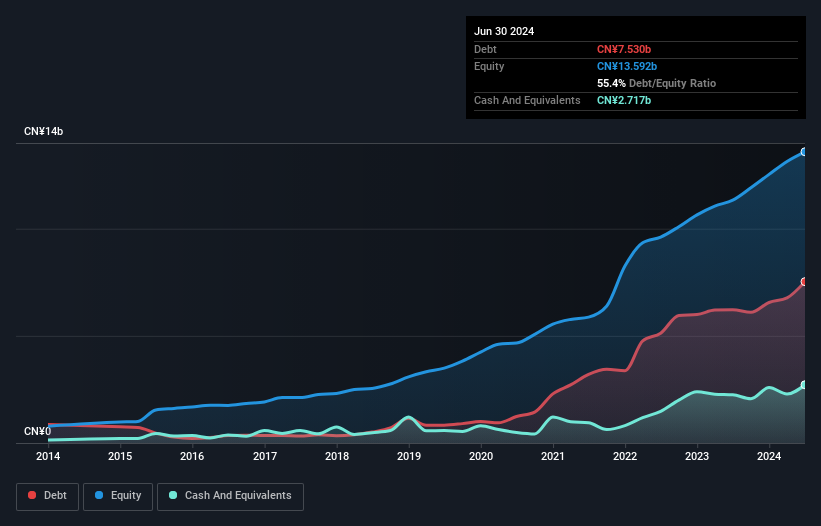Is Zhejiang Weiming Environment Protection (SHSE:603568) A Risky Investment?
Warren Buffett famously said, 'Volatility is far from synonymous with risk.' So it might be obvious that you need to consider debt, when you think about how risky any given stock is, because too much debt can sink a company. As with many other companies Zhejiang Weiming Environment Protection Co., Ltd. (SHSE:603568) makes use of debt. But should shareholders be worried about its use of debt?
When Is Debt Dangerous?
Generally speaking, debt only becomes a real problem when a company can't easily pay it off, either by raising capital or with its own cash flow. In the worst case scenario, a company can go bankrupt if it cannot pay its creditors. However, a more frequent (but still costly) occurrence is where a company must issue shares at bargain-basement prices, permanently diluting shareholders, just to shore up its balance sheet. Having said that, the most common situation is where a company manages its debt reasonably well - and to its own advantage. When we examine debt levels, we first consider both cash and debt levels, together.
View our latest analysis for Zhejiang Weiming Environment Protection
What Is Zhejiang Weiming Environment Protection's Debt?
As you can see below, at the end of June 2024, Zhejiang Weiming Environment Protection had CN¥7.53b of debt, up from CN¥6.22b a year ago. Click the image for more detail. However, because it has a cash reserve of CN¥2.72b, its net debt is less, at about CN¥4.81b.

How Strong Is Zhejiang Weiming Environment Protection's Balance Sheet?
Zooming in on the latest balance sheet data, we can see that Zhejiang Weiming Environment Protection had liabilities of CN¥3.55b due within 12 months and liabilities of CN¥8.91b due beyond that. Offsetting this, it had CN¥2.72b in cash and CN¥3.74b in receivables that were due within 12 months. So its liabilities total CN¥6.00b more than the combination of its cash and short-term receivables.
Given Zhejiang Weiming Environment Protection has a market capitalization of CN¥34.0b, it's hard to believe these liabilities pose much threat. Having said that, it's clear that we should continue to monitor its balance sheet, lest it change for the worse.
We measure a company's debt load relative to its earnings power by looking at its net debt divided by its earnings before interest, tax, depreciation, and amortization (EBITDA) and by calculating how easily its earnings before interest and tax (EBIT) cover its interest expense (interest cover). This way, we consider both the absolute quantum of the debt, as well as the interest rates paid on it.
Zhejiang Weiming Environment Protection's net debt is only 1.4 times its EBITDA. And its EBIT covers its interest expense a whopping 19.5 times over. So we're pretty relaxed about its super-conservative use of debt. On top of that, Zhejiang Weiming Environment Protection grew its EBIT by 37% over the last twelve months, and that growth will make it easier to handle its debt. When analysing debt levels, the balance sheet is the obvious place to start. But it is future earnings, more than anything, that will determine Zhejiang Weiming Environment Protection's ability to maintain a healthy balance sheet going forward. So if you're focused on the future you can check out this free report showing analyst profit forecasts.
But our final consideration is also important, because a company cannot pay debt with paper profits; it needs cold hard cash. So we always check how much of that EBIT is translated into free cash flow. Considering the last three years, Zhejiang Weiming Environment Protection actually recorded a cash outflow, overall. Debt is far more risky for companies with unreliable free cash flow, so shareholders should be hoping that the past expenditure will produce free cash flow in the future.
Our View
The good news is that Zhejiang Weiming Environment Protection's demonstrated ability to cover its interest expense with its EBIT delights us like a fluffy puppy does a toddler. But we must concede we find its conversion of EBIT to free cash flow has the opposite effect. All these things considered, it appears that Zhejiang Weiming Environment Protection can comfortably handle its current debt levels. On the plus side, this leverage can boost shareholder returns, but the potential downside is more risk of loss, so it's worth monitoring the balance sheet. When analysing debt levels, the balance sheet is the obvious place to start. However, not all investment risk resides within the balance sheet - far from it. For instance, we've identified 1 warning sign for Zhejiang Weiming Environment Protection that you should be aware of.
When all is said and done, sometimes its easier to focus on companies that don't even need debt. Readers can access a list of growth stocks with zero net debt 100% free, right now.
Have feedback on this article? Concerned about the content? Get in touch with us directly. Alternatively, email editorial-team (at) simplywallst.com.
This article by Simply Wall St is general in nature. We provide commentary based on historical data and analyst forecasts only using an unbiased methodology and our articles are not intended to be financial advice. It does not constitute a recommendation to buy or sell any stock, and does not take account of your objectives, or your financial situation. We aim to bring you long-term focused analysis driven by fundamental data. Note that our analysis may not factor in the latest price-sensitive company announcements or qualitative material. Simply Wall St has no position in any stocks mentioned.
 Index Options
Index Options CME Group
CME Group Nasdaq
Nasdaq Cboe
Cboe TradingView
TradingView Wall Street Journal
Wall Street Journal